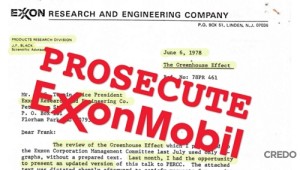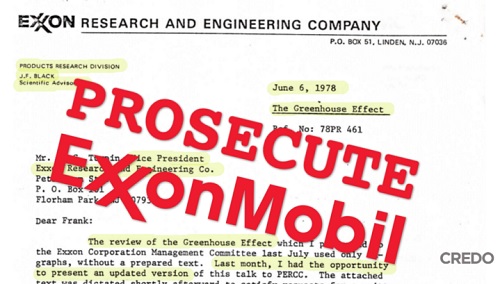
Severe flooding has hit India’s tea-growing state of Assam and neighboring Nepal, killing at least 200 people, flooding thousands of villages and displacing nearly three million people.
The floods are yet another, daily reminder, of the human and financial cost of climate change.
If the fossil fuel industry had acted decades ago, we would not be in a climate emergency. And some believe that this climate emergency is going to cause a financial emergency too.
A new report, published last week by U.S. National Whistleblower Center (NWC), entitled “How fossil fuel industry fraud is setting us up for a financial implosion – and what whistleblowers can do about it,” does not mince its language.
It outlined what it called “widespread deception by fossil fuel executives regarding the financial risks of climate change [which] represents a ticking time bomb that, if not addressed, could contribute to worldwide economic devastation.”
It claims it is the “first-ever analysis of legal strategies for exposing climate risk fraud by the fossil fuel sector,” and says it is a “call to action” for executives of fossil fuel companies and others with knowledge of improper accounting and disclosure practices, such as external auditors, to blow the whistle on the decades of deception.
The NWC argues that cases such as five existing cases against Exxon, like by the state of Massachusetts, are “likely just the tip of the iceberg.” There will be many more to come, especially when whistleblowers realize the protections that can be afforded to them if they speak out.
The NWC is now explicitly asking for senior people within the oil industry to become whistleblowers. It is only logical that “whistleblowers in the fossil fuel industry, like their predecessors in the tobacco, banking and healthcare industries, can play a central role in industry reform and help prevent a worldwide financial implosion.”
It is better to blow the whistle and get protected legal immunity than end up being prosecuted. The report “calls upon executives of fossil fuel companies and others with knowledge of improper climate risk disclosure practices to take the steps needed to obtain protected whistleblower status and work with the SEC, other regulators and law enforcement officials to help expose and prosecute fraud.”
If senior executives do not come forward, they could end up in the dock. More litigation is only a matter of time. Among climate lawsuits filed to date, what remains unaddressed is the “dramatic understatement of risks posed by climate change to fossil fuel companies’ own financial condition and to the economy at large.”
Key findings of the report include that “Deception about the financial risks of climate change is pervasive across the fossil fuel industry.” It outlines that fossil fuel company disclosures on climate change risks frequently omit seven key areas of information that are highly material to shareholders:
- Omission #1: Lack of preparedness for policies encouraging a transition away from carbon-intensive energy technologies;
- Omission #2: Vulnerability to disruption from low-carbon technologies;
- Omission #3: Justifications for optimistic price assumptions;
- Omission #4: Plans for removing carbon from emissions;
- Omission #5: Liabilities for toxic wastes, carbon pollution and other environmental impacts;
- Omission #6: Climate change-related damage to infrastructure;
- Omission #7: Climate risks to the global financial system
The report concludes failure to disclose climate risks threatens not just individual companies and their shareholders, but also “the banks, investors and insurers that provide support to these companies, and ultimately the entire financial system.”
#FossilFuel Industry Deception re: #ClimateRisk a 'Ticking Time Bomb Threatening the Global Financial System' https://t.co/lgCSssLJYr
— Carbon Tracker (@CarbonBubble) July 23, 2020
John Kostyack, NWC Executive Director and lead author of the report stated, “in light of the deceptions we found, the handful of pending fraud cases challenging climate risk disclosures by fossil fuel companies are probably just the tip of the iceberg.”
Kostyack continued: “We anticipate that the number of cases and defendants will increase dramatically in the near future once potential whistleblowers learn about the benefits of modern whistleblower laws and begin providing information to regulators and prosecutors about climate risk deceptions along the lines of those outlined in our report.”

